RANDY BAKER, Playwright
Michael: Introduce yourself, Rorschach, and the play Forgotten Kingdoms in under 140 characters. Go! No, just kidding…just tell us something about yourself and about this crazy play you’re mounting (which runs to May 21).
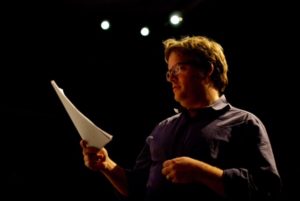
Randy: Forgotten Kingdoms dramatizes a clash of civilizations through the conversation of two men from very different worlds—an American Christian missionary and a local Muslim who has no interest in being converted. Much of the play is inspired by my own experiences and the stories I heard growing up in Singapore. My missionary grandfather’s stories were always fantastical and often troubling to my growing moral relativism. But when I started writing Forgotten Kingdoms I did so as an attempt to understand him. I wanted to write about him without judgment and meet him on his own terms.
Understanding another culture can be difficult but so can empathizing with things closer to home—our country, our family. Sometimes understanding requires that we have empathy for someone who doesn’t hold our beliefs; sometimes it means that for a moment we believe in someone else’s ghosts.
I love that we’re premiering this play at Rorschach Theatre where I serve as Co-Artistic Director with Jenny McConnell Frederick, because Rorschach has never looked for easy answers. The name comes from the famous Rorschach test, which demands that the patient look inward, and that philosophy has always been an important part of the company’s mission.
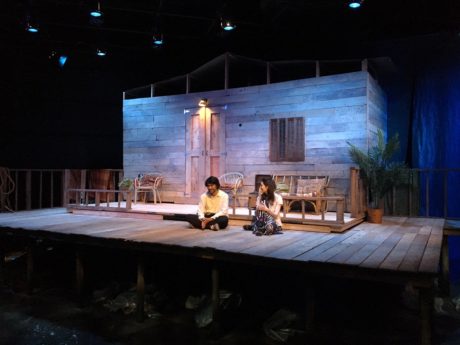
The stories that formed this play have been with me as long as I can remember, but I started dramatizing it about six years ago. I started with a simple question that always intrigued me—what would happen on the night when my grandfather met his match? What if his whole life unraveled because of it?
After submitting the play as my graduate school thesis in 2012, I had a number of workshops in Houston, New York and here in DC. When we decided we would produce this as Rorschach, I took the play home and developed it in Malaysia and Indonesia, culminating with a public reading in Jakarta. It was in Jakarta that I met Rizal Iwan, the Indonesian actor we have brought over to play the role of Yusuf in the full production.
How much of your personal life did you put into this script?
There are a lot of details that are lifted directly from my family’s stories—my grandfather told stories about a little girl on the verge of death that he brought back to life with his healing hands; my grandmother played the accordion on the back of a truck while the kids sang; they lived in a house on stilts over the ocean. There are countless details—conscious and otherwise—that are taken from my experiences and from the stories of my family, but in many ways those stories are the artifacts of where I began this story. Somewhere along the way, inspiration gave way to creation, and as I learned more about these characters—especially through the collaboration with directors, actors and trusted collaborators—they became something new.
Every description of this play that I have read, no better how brief, includes the line, “a wooden house balances on stilts over a churning sea.” Is there something about that image that strikes you?
When my grandparents were doing their missionary work in Tanjung Pinang Indonesia, they lived in a Kampung Laut (Water Village), a common feature of coastal towns in Malaysia and Indonesia. Kampung Lauts are entire towns that are built out of wood on stilts over the ocean and are connected to the mainland and to each other by creaking jetties. Sometimes they become large towns, sometimes there is a single house connected to the land.
I was especially drawn to the metaphor—the idea of a missionary who lives in a place where he can always see the town in the distance but never actually be a part of it. I also love the idea of an unpredictable element of the natural world inches below a contentious conversation. As battles between civilizations are fought on the boards above it, the danger of the churning sea threatens to consume them all.
What is it about Southeast Asia that speaks to you artistically?
It’s about memory. When I think about my experiences of childhood, I remember the sights and smells of where I grew up. Every artist is influenced by the memories of their past—mine just happened to have taken place in another country. Though I have experimented with using Asian theatrical techniques in my directing—shadow puppets in A Midsummer Night’s Dream, Suzuki-inspired movement in Rorschach’s Very Still and Hard to See—this play is written in a very American style. It may be set in Indonesia, but the style of the play owes more to Tennessee Williams and Eugene O’Neill than it does to South East Asia.
My feelings on cultural authenticity are of course complicated. I’m an American who grew up in Asia and has had family living in Asia for three generations, but I am still American. I always try to approach projects with the idea that they are a cultural exchange and not cultural appropriation. I try to remain honest about the point of view with which I present the show and the artists with whom I collaborate.
CARA GABRIEL, Director
Michael: What’s the first thing you do after you read a script that you’re going to direct?
Cara: I read it a second time! Then I start taking notes. I really respond to the words in a piece first, so I pull out all of the key words and phrases, anything that resonates with me emotionally or intellectually. From this list I’m usually able to find some key themes and major dramatic questions. For Forgotten Kingdoms, I think my list of phrases and questions was three or four pages long. That’s the language that I then use to begin conversations with my designers. In this process I was also lucky to have the playwright in the room, so I had a lot of questions for him, too, after my first read: What do you love most about this play, what scares you about it, what do you want the audience to feel when they leave the theatre, etc.
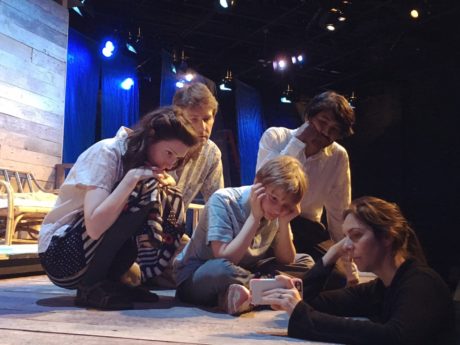
The American news media is so obsessed with the Middle East that I think we forget that there are quite a few Muslims who live in other places in the world, including Southeast Asia. Did your perspective on Islam change while working on the play?
I have to say that my perspective on Islam changed less than perhaps my perspective on faith in general. Everyone in this play—regardless of religion—struggles with faith, forgiveness, grief, and what it means to be “healed.” If anything, I had more work to do overcoming my prejudices and preconceptions regarding Christian missionaries. I had to learn to love and understand the character of David in order to be fair to each fully formed, multi-dimensional character.
The lead role is played by Rizal Iwan, an Indonesia actor. Were there special challenges working with an actor from a different country?
Rizal is amazing, as are all of my actors, honestly. They are generous and kind, funny, and super smart. Mostly I’ve been trying to learn as much as I can about Indonesian culture without tokenizing Rizal or making him the spokesperson for all Indonesians. One of the things we’ve talked a lot about is how Indonesian culture is a very polite culture (and in fact that features prominently in the play), so if there was any challenge with Rizal, I would say it is that he is so polite! American actors often have no problem telling a director that they’d like to try something different or make an alternate choice. I’m used to lots of discussion and contradictions. But with Rizal, sometimes I would give him a piece of direction and he would look at me for a moment and then just say, “OK.” I would have to read him really carefully and sometimes press him to contradict me. “Rizal, it’s OK if you think what I’m telling you is terrible!” Then he would laugh and say, “OK, yeah, this makes no sense.” But once we got to know each other, he contradicted me all the time and became a complete troublemaker in the rehearsal room… No, I’m totally kidding. He’s incredible.
DEB SIVIGNY, Set and Costume Designer
Michael: What is your process for designing a set? Does it start with the space? The budget? The directorial concept?
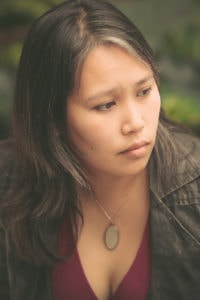
Deb: With a play like Forgotten Kingdoms, a real setting based in an actual place, I start with researching every aspect of the environment—everything from how weather affects wood to the species of plants. I had an incredible opportunity to travel to the Riau islands with Randy last year, so I was able to take pictures and immerse myself in the play’s setting. Recreating realism aside, I knew I had to figure out how to make this idea work inside the Sprenger Theatre.
Cara, Jennifer, and I met a few months ago to share research and create the optimal ground plan for the play. I knew the challenges of creating the design: the practical implications of using real water, the portrayal of a “foreign land” that didn’t feel like a potentially controversial appropriation, and a budget that was generous but didn’t allow for carte blanche. I came prepared with knowledge of Malay house architecture, a list of priorities for the space, and some ideas of how we might create “waterless” water. I think I drew eight thumbnail sketches before the meeting and another sixteen sketches during that meeting. We spent a lot of time asking “what if,” and I really embrace that in the early stages of a design. What is most exciting to me is the collaborative nature of working towards a theatrical space that utilizes all the best ideas of the team.
The set is dominated by a house-like structure that is not quite internal and not quite external. Was your goal to create as open a space as possible?
I wanted to create a space that allowed for a fair amount of movement but that created unspoken rules in where characters could go. The space consists of four major elements: the jetty, the porch, the house, and the water/sky. The jetty is “public” space, where anyone is allowed to venture—and even get quite close to the house. The porch requires that people be invited to it—it’s part of the house, and while it’s the smallest perceived square footage, it’s where the majority of the play takes place. It’s where the character of David has his meetings, and it’s curated by his wife Rebecca in order to create the right impression. It was important to me that we see the character of the space through the furniture and set dressing. There is an indication of life behind the door. From the audience, the house looks larger than it really is—we pack a lot into that tiny space. It’s the opposite of the Tardis—it’s much smaller on the inside. So while it feels open and inviting, there are invisible territories. The final zone consists of the water/sky. It’s a huge element that surrounds the house, and it hides lots of secrets.
Rorschach is famous for its unconventional use of space. Can you give us a hint of what we have to look forward to this time?
Oddly enough, this might be the most conventional set we’ve created in some time. While a house on stilts is no small feat, it’s still a house with four walls and a door. I am excited though about how the set utilizes the space itself. An altered proscenium of sorts, it’ll keep you feeling like the world is just a little askew.
RIZAL IWAN, Actor (Yusuf)
Michael: First of all, welcome to DC! What do you think of our fair capital city?
Rizal: Thank you. It’s my third visit here, but the city’s free access to so many sources of insight and information about American history and culture still fascinates me, and I find myself coming back to some of the places I have already visited before. But also, this time around I get to notice how vibrant the theater scene in the city is, something I hadn’t really realized during my previous visits.
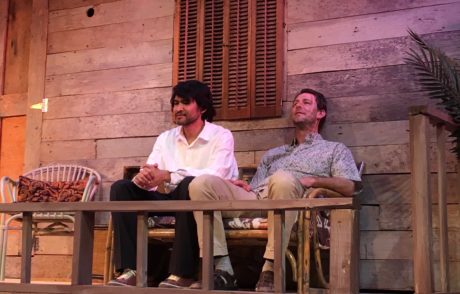
This play centers around colonial exploitation. Have you experienced more subtle forms of Western cultural domination and/or outright racism here in America, and has that informed your understanding of your character?
Personally, I haven’t experienced any kind of racism while I am here. But regarding Western cultural domination, I think I am experiencing it, and not necessarily in a bad way. My generation in Indonesia grew up with American films and shows that we saw on TV, so when I came here, the American culture feels oddly familiar. In a way, it is what my character, Yusuf, is experiencing also. There’s a part in the play in which Yusuf’s fascination with a television set (and what it represents) becomes a pivotal point in his relationship with his father. It’s interesting to note this contradiction in him—on one side suspicious of foreign influences, but on the other side embracing them. But this is what happens to many Indonesians—including me, to a certain extent—and finding this side of me in Yusuf helps me understand him a little better.
Your character is so much defined by his homeland and his religion. Do you feel that strongly identified with those two pieces of your identity?
Maybe not as strongly as Yusuf. I mean, I’ve always been proud of Indonesia for many things, including its diversity. But this very diversity has also taught me to be open to other cultures and values in the world. As for religion, I come from a family of two faiths. My father was a Muslim and my mother was a Christian. And my family has learned to make this work and we respect each other. This has taught me tolerance and kept my mind open to religions that are different than mine. So, I never feel that I am ever defined by my religion.
JONELLE WALKER, Producer
Michael: Why is this play necessary in a day and age when all religious differences have been peacefully accepted, and all the major countries have agreed to stop fighting in favor of a peaceful agreement to treat each other with mutual respect?
Jonelle: Well, since we have no problems to solve … I think what I find so moving about Forgotten Kingdoms is that it is a story so specific to its historical and geographic context; yet its conflict is timeless and almost outside of time. At the heart of any religious conflict—or even any conversation about religion, really—is a tension between that which we hold true to the very foundations of our being and those “truths” that we have always felt skeptical about. Randy grabs us by the hand and gently wades us out into those rocky waters. We get to be with Reverend Holiday and Yusuf as they work through their beliefs, their skepticism, and their passionate defense of their respective, for lack of a less cliche word, kingdoms. In the specific context of today’s frankly terrifying political climate, I think it is necessary to have this tough conversation about how we justify destroying each other and destroying each other’s sacred worlds because we are convinced there can only be one: ours. More specifically, I think it is important for American audiences to explore conflict between Christianity, Islam, and other religions in a Muslim country outside of the Middle East. Forgotten Kingdoms asks us to expand our thinking on sacred worlds and consider the persistence of belief. The persistence of gods, kings, and kingdoms that we wrongly presume oppression can kill.
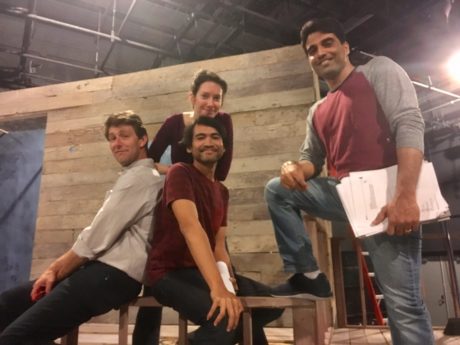
Indonesia has a strong theatrical tradition, and I’m wondering how much of Indonesian theatre practice made its way into the play. I’m thinking especially of the fabulous shadow puppet Midsummer that Randy did for Avant Bard.
What a fabulous question! I think it’s beyond my scope of expertise to speculate on how much of the rich traditions of Indonesian theatre and storytelling made it into Forgotten Kingdoms. I can say that the play builds upon Indonesian history and mythology in a way that should be exciting to audiences familiar and unfamiliar with the culture. So much of Yusuf’s personal history is tied up in the stories of great Indonesian heroes told to him by his father. I think it’s a beautiful parallel to what a storyteller Randy is and how he introduces audience that may not be versed in Indonesian culture to its particular beauty.
There is also extensive dialogue in the play in Bahasa, the official language of Indonesia. This is the first time I’ve heard Bahasa in an American play, so I hope that might also be an exciting and new aural experience for our audiences.
Why this play? Why now?
As you alluded to above, I think we are in a time of particularly fierce global conflict that is underpinned by religious conviction and race relations. There is, I think, a growing sense that the difference between cultures or politics or race is insurmountable; that we as Americans can never understand Syrian refugees, North Korean dictators, or even our own President. In a sense, we cannot completely understand each other. However, the work of being human and coexisting on this planet—and, indeed, the work of Forgotten Kingdoms—is to fight as hard as we can to understand each other as best we can. We will fail often. Learning from that failure, owning the limitations of our understanding, and availing ourselves of the notion that there is only one world (the one we see everyday) is the only solution. I think our audiences—all of us—could use some humbling and cosmic perspective. Forgotten Kingdoms lets us peek under the veil between the everyday and the cosmic.
Forgotten Kingdoms plays through May 21, 2017, at Rorschach Theatre performing at The Paul Sprenger Theatre at Atlas Performing Arts Center – 1333 H Street NE, in Washington, DC. For tickets, call (202) 399-7993 ext. 2, or purchase them online.






My heart still aches after watching this play yesterday afternoon at Rorschach theatre! It blew my mind! The set design, the story unfolding with layers of layers of emotion just let my heart hanging in the midair……..! I love, love this story and it’s attempt to ask and answer questions that’s inbedded in all of us since the beginning of time. I especially like this interview, to make me understand more of the background of this play…… thank you, thank you!